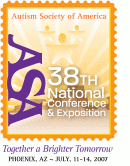 |
The ASA's 38th National Conference on Autism Spectrum Disorders (July 11-14, 2007) of ASAThe Westin Kierland Resort & Spa, Scottsdale, AZ |
| For a complete author index with session numbers, please click here | |
| Friday, July 13, 2007: 1:15 PM-2:30 PM | |||
| Kirkland | |||
| #2549- When the School Bus Stops Coming: The Dilemma for Adults with Autism-ASHA CEU Session | |||
| This session will address the life needs of adults with autism and how those needs can be more readily satisfied by a carefully circumscribed Transition Plan detailing those needs.
We will address the components of a Life Transition Plan including; Recreational, Leisure, Spiritual, Employment, Residence, Physical Health, Emotional Health, Behavioral Health, Social, and Geriatric Domains.
We will next cover the various federal and state initiatives available for adults with autism and how to access those initiatives through advocacy and knowledge.
| |||
| Presenters: | - Dr. David L. Holmes, Chairman and CEO of Lifespan Services, LLC, is a Board Certified Forensic Examiner in Behavioral Science and Psychology; He is immediate past president and founder of The Eden Family of Services and Chairman of the Panel of Professional Advisors of the Autism Society of America. He serves on the psychology faculty of Princeton University. He has been a featured guest on National Public Radio’s “Talk of the Nation” and on CNN’s “House Call”. Dr. Holmes is a national award winning author of numerous books, book chapters and articles, most notably, Autism through the Lifespan-The Eden Model.
- Began career as a vocational rehabilitation counsellor and worked up through the Division to become its' Director. Have served in vocational rehabilitation for 40 years and have a significant interest in ensuring that adults with autism have equal opportunity to work and live in their communities. | ||
|
| |||
|
When the school bus stops coming is when parents and individuals with autism face the stark reality that the entitlements under IDEA (the Individuals with Disabilities Education Act) are no longer accessible. They are now faced with the challenge of figuring out what services, if any, are needed and available and, most importantly, financially supported under the federal or state mandates for citizens with disabilities. What typically occurs is that families either hibernate or engage in a quest to secure whatever services that they can; even if they are not appropriate to their, now adult, child. The quest is often akin to Don Quixote's, “ to reach the unreachable…”. All is not lost, however, if girded with knowledge and resoluteness. There are currently federal, state and local resources that can help support appropriate services for adults with autism; but they are difficult to identify and even more difficult to access. Before individuals reach the years beyond education entitlements it is critical to establish transition plans and training that will prepare them and their support staff for the many more years that transcend the school age years. This is called Transition Planning. Adolescents with Autism become Adults with Autism and therefore will require a Transition I.E.P. This must occur by their 16th birthday but should occur well before. The Transition Plan should include domains such as; Recreation, Leisure, Employment, Residence, Spiritual Health, Physical Health, Emotional Health, Behavioral Health, Social and Geriatric. In order to ensure an appropriate and effective service it is essential to know what's available and to secure what's needed. If they come together that is fine but typically “what's available” and “what's needed” are light years apart. This presentation will address these issues in a thorough and case study approach in order to ensure addendees have a practical approach to acquiring services for their loved one or themselves.
|
|||
See more of General Submissions
See more of The ASA's 38th National Conference on Autism Spectrum Disorders (July 11-14, 2007)